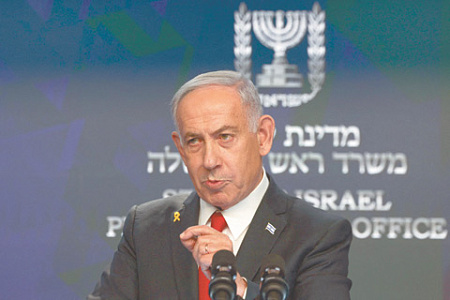
Israel has notified the United States of its intention to strike Iran’s nuclear facilities even in the context of the ongoing negotiation process between Tehran and Washington, according to American media. According to them, such a signal led to a tense telephone conversation between President Donald Trump and Prime Minister Benjamin Netanyahu. The US intelligence community suspects that the Jewish state may launch an operation against Iran on its own, without notifying the White House. But such a military campaign is not feasible without American help.
In early May, Israeli government agencies notified their U.S. counterparts of their readiness to bomb Iran’s nuclear infrastructure, sources told The New York Times (NYT). This, according to the newspaper, was the reason for a tense telephone conversation between Trump and Netanyahu. It took place last week. The head of the White House then attempted to dissuade the Israeli Prime Minister from the operation against the Islamic Republic, with which the United States has been trying to conclude a nuclear agreement these months. But he apparently remained of his opinion: Netanyahu believes that now is the best time to strike Iran, because it is still weakened due to the Israeli airstrike in October.
This is not the only report according to which the conversation between the leaders of the United States and Israel on May 22 was tense. As Channel 12 of Israeli TV informed the other day, the atmosphere of the conversation between Trump and Netanyahu was extremely difficult due to the American leader’s desire to dissuade his ally from the need for any forceful actions against Iran now that negotiations are continuing in Oman and Italy. It also follows from Channel 12’s data that Trump took Netanyahu’s conviction that there was no alternative to military action personally: the US president stressed during a telephone conversation that he was able to conclude the best version of the nuclear deal, which would eventually meet the interests of the Jewish state.
According to Axios, the head of the White House told the Israeli Prime Minister that “another option” for action against Iran is, of course, on his table, but first he needs to try to come to an amicable agreement with the Islamic Republic.
However, according to the US intelligence community, Israel may decide to launch a series of bombings on its own, without any notification to an ally, the NYT shares. According to the calculations of the American security apparatus, the Jewish state is able to practically prepare for the operation in just seven hours and thereby deprive Washington of the opportunity to somehow prevent it. However, US intelligence analysts are raising the question of how effective an independent Israeli strike would be without direct American support.
An independent force scenario would mean a stress test for U.S.-Israeli bilateral relations, but Netanyahu seems to have his own calculations. The NYT points out that Netanyahu’s entourage is convinced that in the event of a direct confrontation, the United States will inevitably join in and support Israel as its Middle East ally.
The other day, the commander-in-chief of the Iranian army, Abdulrahim Mousavi, said that any Israeli attack would lead to an inevitable response and direct confrontation between the two regional adversaries. “Because it’s there now (in Israel. – “NG”) is ruled by criminals, infanticides and fools, any mistake is possible, – the military commander noted. – If they are in a hurry to get a new “True Promise” (last year’s Iranian operations to launch missiles and drones towards the Jewish state. – NG), then we are fully prepared.” However, according to Mousavi, the Israel Defense Forces (IDF) is unable to inflict any serious damage to the Islamic Republic, because, according to him, the Israelis’ resources are limited.
As for the United States, the Iranian authorities are making conciliatory statements to them, signaling their readiness for any compromise on the deal, except for abandoning the civilian uranium enrichment program. “Under the current course of negotiations, if an agreement is reached and all Iran’s wishes are taken into account, then we can consider once again the issue of the participation of Americans in inspections by the International Atomic Energy Agency (IAEA),” Mohammad Eslami, head of the Atomic Energy Organization of Iran (AEOI), promised the other day, stressing that Iran’s restrictions on the activities of IAEA inspectors in the past were a mirror response to international pressure.
“Despite the fact that the IDF Air Force has the strongest potential in the world and is capable of providing a massive group raid in a layered tactical formation of fighters, an attack on Iran’s nuclear facilities will still require American assistance,” Anton Mardasov, an expert on the Middle East, explained in a conversation with NG. “Undoubtedly, Israel is capable of acting independently, having extensive reconnaissance capabilities and an arsenal of long–range missiles, as well as precision guided munitions for hitting targets in depth, but Iran’s nuclear facilities are well fortified and scattered throughout the country, which makes it difficult to quickly destroy them.”
The specifics of the Iranian targets in the event of the launch of an Israeli operation will require “at least impressive logistical support from the United States, and, as a maximum, their provision of intelligence support, assistance in suppressing air defense systems and other things,” the source added. “It’s one thing to sabotage using cyber technologies, drones and strikes from Iraq’s airspace, which Iran can ignore, declaring them unsuccessful, regardless of the result, and quite another is a massive strike on its nuclear facilities,” Mardasov stressed. “This will be unacceptable for the image of Tehran, which will have to respond in kind, for example, by launching missiles in the confusion, including at American facilities in the Middle East.”
